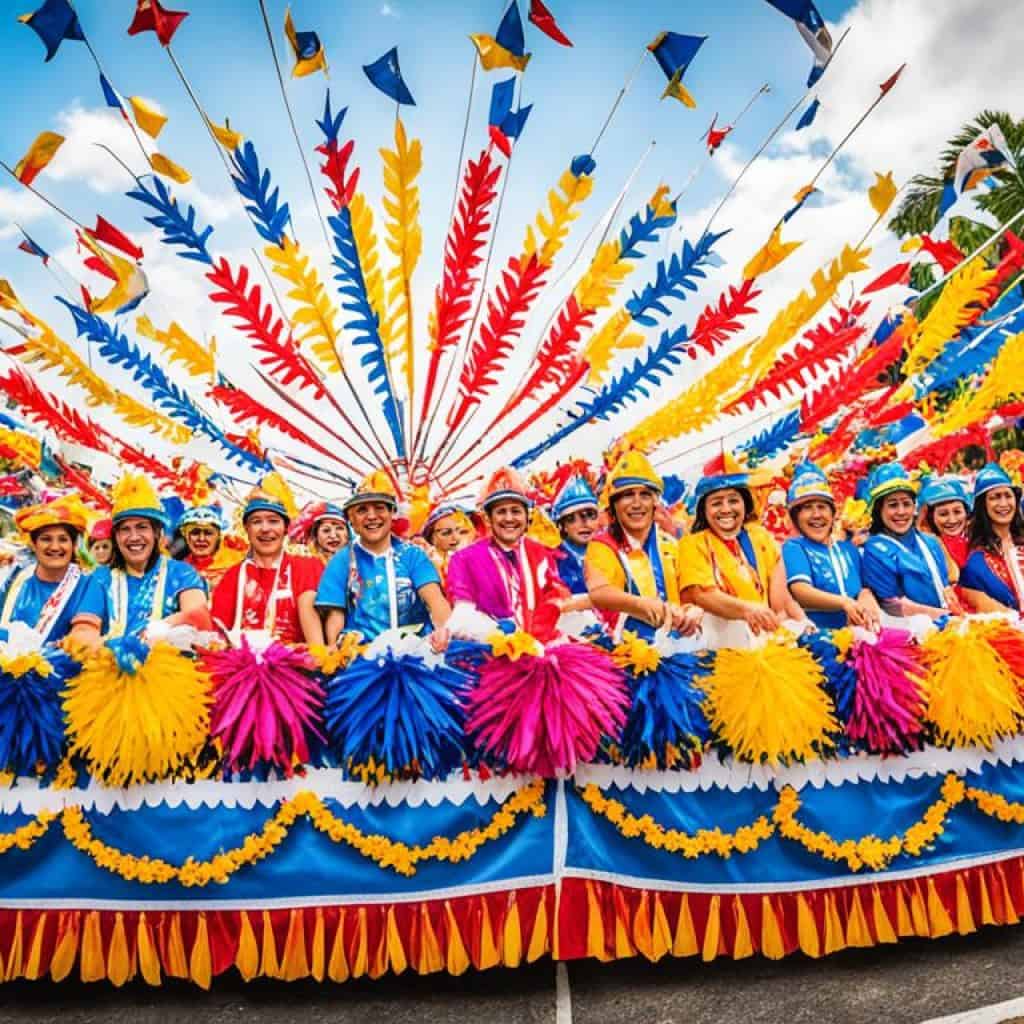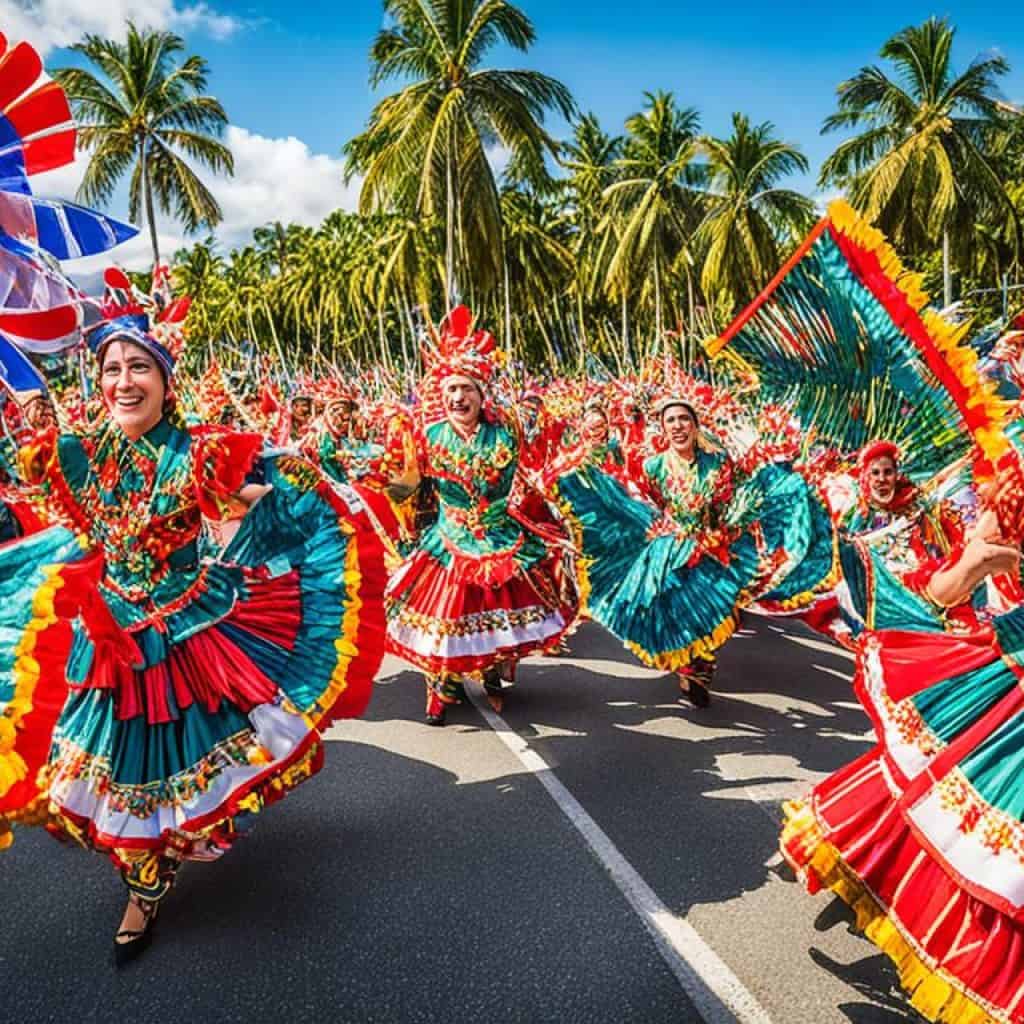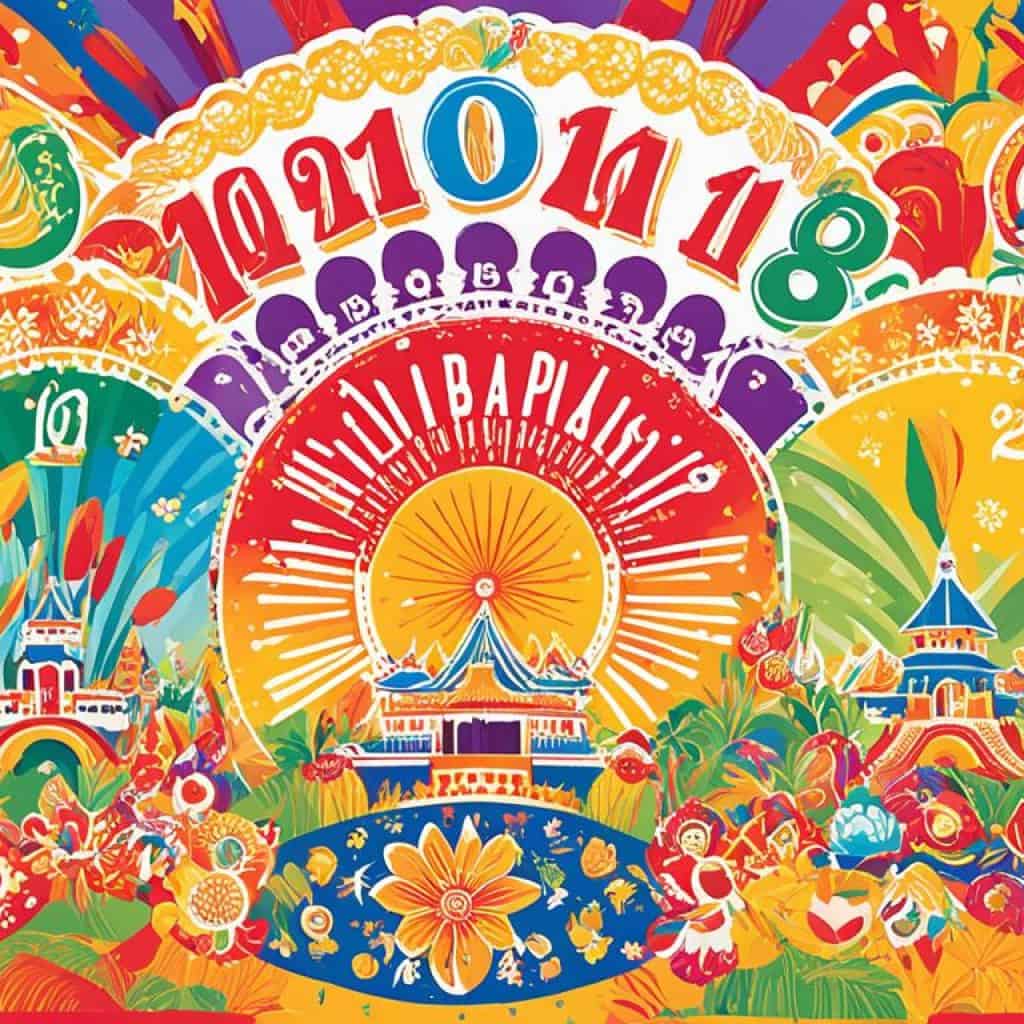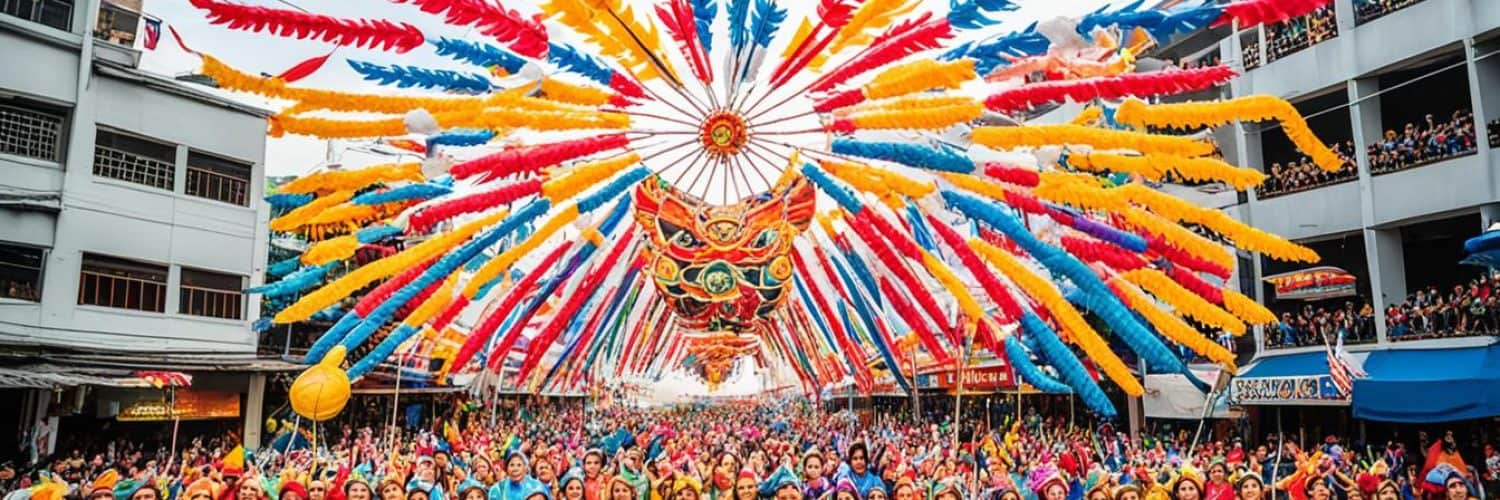How many holidays are there in the Philippines? Are Filipino holidays different from public holidays? What is the official holiday calendar in the Philippines? If you’ve ever wondered about the number and types of holidays celebrated in the Philippines, you’re in for a fascinating journey. In this article, we will delve into the world of Philippine holidays and explore the diverse celebrations that take place throughout the year.
Key Takeaways:
- The Philippines observes 18 national holidays each year, including 4 special non-working days.
- All employees are entitled to a paid day off for the 14 national holidays.
- The Office of the President regulates national holidays and can make changes to the public holiday dates.
- Special non-working days do not qualify for holiday pay.
- The Philippine holiday calendar includes regular fixed holidays as well as additional localized holidays observed in specific areas.
National Holidays in the Philippines
The Philippines has a total of 18 national holidays, which are widely celebrated throughout the country. These national holidays hold great significance and are observed by both the public and private sectors. They provide an opportunity for Filipinos to commemorate important events, cultural traditions, and symbolic occasions.
Some of the notable national holidays in the Philippines include:
- New Year’s Day
- Philippine Independence Day
- Christmas Day
- Labor Day
- National Heroes Day
These holidays, as mandated by the Labour Code of the Philippines, entitle employees to a paid day off, ensuring they have the opportunity to celebrate and spend time with their families and loved ones.
However, it’s important to note that special non-working holidays, although widely observed, are not included in the list of official national holidays. Special non-working holidays do not qualify for holiday pay and are subject to the discretion of employers when it comes to granting time off and providing additional benefits.
National holidays in the Philippines are a reflection of the country’s rich history, cultural diversity, and important milestones. They serve as a reminder of the values and achievements that shape the Filipino identity, fostering a sense of unity and national pride.
Special Non-Working Holidays in the Philippines
In addition to the national holidays, the Philippines also observes special non-working holidays. These holidays do not have fixed dates and are determined by the Presidential Declaration released each year. Some examples of special non-working holidays in the Philippines include Eidul Fitr, Eidul Adha, and Ninoy Aquino Day. These holidays are not entitled to holiday pay but may be granted additional benefits depending on company policies or collective bargaining agreements.
Examples of Special Non-Working Holidays in the Philippines
Here are some notable special non-working holidays in the Philippines:
- Eidul Fitr
- Eidul Adha
- Ninoy Aquino Day
These holidays hold significant cultural and historical importance in the Philippines. While they do not qualify for holiday pay, employers may offer extra benefits or incentives to their employees during these special non-working holidays.
It’s worth noting that the dates of these holidays may change each year, depending on the Presidential Declaration. Therefore, it’s essential to stay updated with the latest announcements to plan your activities and events accordingly.
Company Policies and Special Non-Working Holidays
While special non-working holidays do not mandate holiday pay, some companies may have their own policies regarding compensation and benefits during these holidays. It’s recommended for employees to review their company’s policies or consult their human resources department to ensure they are aware of any additional benefits or incentives they might be entitled to during special non-working holidays.
List of Special Non-Working Holidays in the Philippines
| Holiday | Date |
|---|---|
| Eidul Fitr | Varies (based on the lunar cycle) |
| Eidul Adha | Varies (based on the lunar cycle) |
| Ninoy Aquino Day | August 21 |
Regular and Fixed National Holidays in the Philippines
The Philippines celebrates 11 regular and fixed national holidays annually. These holidays follow specific dates each year and have significant cultural, historical, and religious importance to the Filipino people. Recognized as official holidays throughout the country, they provide opportunities for rest, reflection, and national celebration.
Below is a list of the regular national holidays in the Philippines:
- New Year’s Day (January 1)
- Maundy Thursday (Thursday before Easter Sunday)
- Good Friday (Friday before Easter Sunday)
- Araw ng Kagitingan (Day of Valor) (April 9)
- Labor Day (May 1)
- Independence Day (June 12)
- National Heroes Day (Last Monday of August)
- Bonifacio Day (November 30)
- Christmas Day (December 25)
- Rizal Day (December 30)
These regular national holidays are established by Republic Act 9492, also known as the “Holiday Economics Law.” They honor significant events in Philippine history and the country’s heroes, allowing Filipinos to commemorate their nation’s achievements and identity.
“The regular national holidays in the Philippines serve as reminders of our rich heritage and the sacrifices made by our ancestors. It is a time for Filipinos to come together, reflect, and express gratitude for their country and the freedoms they enjoy.”

These regular national holidays provide an opportunity for individuals and families to bond, engage in cultural activities, and partake in various festivities across the country. They contribute to the strengthening of Filipino traditions and values, fostering a sense of unity and patriotism.
Planning ahead for these fixed holidays allows individuals to maximize their celebratory experience and make the most of their well-deserved time off. It is advised to check the holiday calendar and local announcements for any additional special events or regional festivities that coincide with these regular national holidays.
Overtime and Compensation for Holiday Work in the Philippines
Employees in the Philippines who work on national holidays or special non-working holidays are entitled to additional compensation, ensuring fair remuneration for their dedication and sacrifice. The Labour Code of the Philippines outlines the specific payment provisions for holiday work, including overtime pay and compensation rates.
According to the Labour Code, employees who work on a national holiday are entitled to twice their normal salary for every hour worked. This guarantees that employees receive fair compensation for their time and effort during these important national observances.
Similarly, those who work on a special non-working day are guaranteed a rate of one and one-third their average wage. This recognition of the employees’ commitment provides substantial compensation for their valuable contributions during these special occasions.
It’s important to note that these additional compensation rules also apply to overtime work done during holidays. Employees who exceed their regular working hours while working on a holiday are eligible for overtime pay, which is calculated based on the current overtime rates.
By implementing these compensation regulations, the Philippines ensures that employees are properly rewarded for their dedication and effort while maintaining a fair and equitable work environment.
“I believe in rewarding my employees for their hard work, especially when they go the extra mile by working on holidays. It’s important to create an environment that values and appreciates their efforts.” – Julie Santos, HR Manager
Long Weekends and Holidays in the Philippines
The Philippines is a country that offers numerous long weekends throughout the year, allowing individuals to indulge in leisure activities and explore the beauty of the archipelago. These extended breaks provide ample opportunities for rest, relaxation, and travel.
One of the most anticipated holiday periods in the Philippines is the Holy Week. Spanning from Maundy Thursday to Easter Sunday, this religious observance creates the longest consecutive days off in the country’s holiday calendar. It is a time when Filipinos engage in various religious activities, spend quality time with their families, and take advantage of the long break to plan vacations or participate in local festivities.
Aside from the Holy Week, there are other holidays that create long weekends in the Philippines. National Heroes Day, celebrated on the last Monday of August, honors the country’s national heroes and provides a three-day weekend for people to unwind and reflect on the sacrifices of these esteemed individuals. Another holiday that grants an extended break is All Saints’ Day, which falls on November 1st. Filipinos often take this opportunity to visit the gravesites of their departed loved ones and pay their respects.
To make the most of these long weekends, many Filipinos plan trips within the country, taking advantage of the diverse attractions the Philippines has to offer. From stunning beaches and scenic mountains to historical sites and cultural festivities, there is something for everyone to enjoy during these extended breaks.
Long Weekends in the Philippines – A Quick Overview
| Holiday | Date | Duration |
|---|---|---|
| Holy Week | Varies (usually April) | 4 days (Thursday to Sunday) |
| National Heroes Day | Last Monday of August | 3 days (Saturday to Monday) |
| All Saints’ Day | November 1st | 3 days (Saturday to Monday) |
These long weekends present opportunities for both locals and tourists to unwind, recharge, and explore the beautiful destinations and cultural heritage of the Philippines.
Whether it’s immersing in the crystal-clear waters of the white sand beaches, embarking on breathtaking hikes in the lush mountains, or participating in festive celebrations, the long weekends in the Philippines offer countless memories waiting to be made.
So mark your calendars and plan your trips accordingly to fully enjoy the long weekends in the Philippines!
Additional Localized Holidays in the Philippines
Aside from the national and special non-working holidays, there are also localized holidays celebrated in certain cities and municipalities in the Philippines. These local holidays hold great significance in their respective areas, honoring historical events, cultural traditions, and local heroes.
One example of a localized holiday is Manila Day, which commemorates the foundation of the City of Manila. Celebrated on June 24th, this holiday allows Manileños to reflect on their city’s rich history and pay tribute to its cultural heritage.

“Manila, the Pearl of the Orient, shines on Manila Day as we celebrate our city’s past, present, and future. It is a time for us to come together and appreciate the unique beauty and character that define Manila.”
Quezon City, the largest city in Metro Manila, also has its own localized holiday called Quezon City Day. Celebrated on October 12th, this holiday honors the birth anniversary of Manuel L. Quezon, the first president of the Commonwealth of the Philippines and the city’s namesake.
“Quezon City Day reminds us of President Quezon’s vision for a prosperous and progressive city that upholds the welfare of its residents. It is a day to celebrate our achievements and renew our commitment to building a brighter future for Quezon City.”
These localized holidays typically involve various activities and festivities in their respective cities. They may include parades, cultural shows, exhibitions, and other community events to showcase the unique identity and vibrant spirit of the local community.
Philippine Festivals and Celebrations
The Philippines is renowned for its vibrant cultural festivals, which serve as colorful showcases of the country’s rich traditions and heritage. These festivities attract both locals and tourists from around the world, offering unique experiences to immerse in the vibrant local culture.
One of the popular festivals is the Philippine International Hot Air Balloon Fiesta, where the sky comes alive with a mesmerizing display of colorful hot air balloons. This event, held annually in Clark Freeport Zone, Pampanga, features thrilling activities such as aerial shows, skydiving, and remote-controlled aircraft exhibitions. It is a truly breathtaking spectacle that captivates the imagination of attendees.
The Giant Lantern Festival, also known as “Ligligan Parul,” is another must-see celebration in San Fernando City, Pampanga. This festival showcases the artistry and craftsmanship of local lantern makers who construct magnificent giant lanterns shimmering with elegant lights and patterns. The intricate displays illuminate the night sky and create a magical ambiance for all to enjoy.
The MassKara Festival, held in Bacolod City, is another beloved event that celebrates the resilience and vibrant spirit of the Filipino people. The festival is characterized by its vibrant masks, adorned with colorful feathers and beads, worn by performers who dance to lively music on the streets. The MassKara Festival exudes joy, unity, and the unwavering optimism of the Bacolodnons.
Originating in Kalibo, Aklan, the Ati-Atihan Festival is considered the “grandfather of all Philippine festivals.” This week-long celebration honors the Santo Niño, a representation of the child Jesus. It involves participants dressed in traditional Ati warrior costumes smearing their faces with black soot and dancing to rhythmic drum beats. The festival is a colorful expression of faith, unity, and cultural heritage.
These are just a few examples of the diverse and captivating festivals in the Philippines. Whether it’s witnessing the majestic hot air balloons, marveling at the intricate lantern displays, joining the lively street dances, or immersing in age-old traditions, the Philippine festivals offer a delightful adventure and an opportunity to appreciate the country’s rich cultural tapestry.
Philippine Festival Highlights
Each festival in the Philippines has its own highlights and unique features. Experience the vibrant diversity of Filipino culture through these must-see festivals:
“The Philippine International Hot Air Balloon Fiesta offers thrilling activities like hot air balloon flying and skydiving, creating picturesque spectacles in the sky.”
Witness the awe-inspiring spectacle of colorful hot air balloons soaring above the picturesque landscapes at the Philippine International Hot Air Balloon Fiesta. This festival, held annually in Pampanga, offers thrilling activities such as hot air balloon flights and skydiving. Capture breathtaking views and create lasting memories as you immerse yourself in this exhilarating celebration of flight.
“The Giant Lantern Festival in San Fernando City showcases beautifully crafted giant lanterns that illuminate the night sky, captivating spectators with their intricate designs.”
Be mesmerized by the enchanting glow of intricately designed giant lanterns at the Giant Lantern Festival in San Fernando City. This highly anticipated event features stunning displays of enormous lanterns, each meticulously adorned with vibrant colors and patterns. As darkness falls, the lanterns illuminate the night sky, creating a magical atmosphere that captivates spectators and showcases the exceptional craftsmanship of local artisans.
“The MassKara Festival in Bacolod is famous for its vibrant masks and energetic dances, embodying the spirit of resilience and joy of the Filipino people.”
Join the vibrant festivities at the MassKara Festival in Bacolod, where the streets come alive with colorful masks and exuberant dances. This celebration is a testament to the Filipino spirit of resilience and unwavering joy, even during challenging times. Immerse yourself in the lively performances, savor the delectable local cuisine, and embrace the contagious happiness that permeates every corner of this joyous event.
“The Ati-Atihan Festival in Kalibo is considered the grandfather of all festivals in the Philippines, known for its lively tribal music, synchronized drum beats, and participants painted in traditional Aklan Ati tribal attire.”
Discover the roots of Philippine festivals at the Ati-Atihan Festival in Kalibo, hailed as the grandfather of all festivals in the country. Immerse yourself in the pulsating rhythm of tribal music and synchronized drum beats as participants, adorned in vibrant traditional Aklan Ati tribal attire, dance through the streets. This vibrant celebration showcases the rich cultural heritage of the Aklanons and invites you to experience the authentic traditions of the Philippines.
Embark on a journey of cultural immersion and vibrant festivities by experiencing these top festivals in the Philippines. From thrilling hot air balloon flights to mesmerizing displays of giant lanterns, from the energetic dances of MassKara to the traditional tribal customs of Ati-Atihan, these festivals offer unique highlights that celebrate the rich tapestry of Filipino culture.
Philippine Festival Calendar
Festivals in the Philippines are vibrant celebrations that take place throughout the year, with each month offering a unique lineup of events. From colorful parades to traditional dances and music, these festivals showcase the rich cultural heritage of the Philippines. Whether you’re a local or a traveler, exploring the festival calendar is a great way to plan your trips and immerse yourself in the lively atmosphere of the country.
February
- Panagbenga Festival – Known as the “Flower Festival,” Panagbenga takes place in Baguio City. This month-long event features elaborate floats adorned with colorful flowers, street dancing, and beauty pageants.
May
- Pahiyas Festival – Held in Lucban, Quezon, the Pahiyas Festival celebrates the bountiful harvest with vibrant displays of colorful rice and vegetable decorations adorning the houses. Visitors can also enjoy local delicacies and traditional music.
August
- Kadayawan Festival – Davao City comes alive during the Kadayawan Festival, a week-long celebration of the city’s cultural heritage and abundant harvest. The festival showcases various tribal dances, street parades, and a grand floral float parade.

These are just a few examples of the festivals that grace the Philippine calendar. Each festival offers a unique experience, allowing visitors to witness the vibrant spirit and rich traditions of the Filipino people. Make sure to check the festival dates and plan your visit accordingly to fully immerse yourself in the festivities.
Public Holidays vs. Company Policies in the Philippines
While public holidays in the Philippines are mandated by law and entitle employees to a paid day off, company holiday policies may vary. It is important for employees to understand the differences between public and private holiday policies and the benefits they are entitled to.
“Public holidays are non-negotiable and are guaranteed by the government, ensuring that all employees enjoy a well-deserved break. However, companies have the freedom to implement their own holiday policies, offering additional benefits or incentives to their employees,” says Jenny Santos, HR Manager at Manila Corp.
Many companies in the Philippines recognize the value of their employees’ time and dedication during holidays. Some organizations go beyond the legal requirements and provide extra perks to motivate and reward their staff. These additional benefits can include:
- Double pay for employees who work on public holidays
- Special incentives or bonuses for holiday work
- Flexible holiday schedules to accommodate personal commitments
- Extra vacation days or time-off in lieu for holiday work
These company holiday policies aim to create a positive work environment and enhance employee satisfaction. They serve as a way to recognize and appreciate the efforts employees put into their work, even during holidays.
However, it is important to note that not all companies offer these additional benefits. It is essential for employees to familiarize themselves with their company’s specific holiday policies, which can be found in the company handbook or communicated through official channels such as HR or management.
Public vs. Private Holiday Policies: Know Your Rights
Understanding the differences between public and private holiday policies is crucial for employees to be aware of their rights. Below is a comparison of public and private holiday policies in the Philippines:
| Public Holidays | Company Policies |
|---|---|
| Non-negotiable and mandated by law | Vary depending on the company |
| Entitles employees to a paid day off | Additional benefits may be offered, but not mandatory |
| Includes 18 national holidays and special non-working days | Can differ from company to company |
It is important for employees to be well-informed about their rights and entitlements regarding holiday pay and work during holidays. This knowledge allows employees to make informed decisions and address any concerns they may have with their employer or HR department.
By staying informed about the company’s holiday policies and understanding their rights, employees can ensure they are receiving fair treatment and enjoying the benefits they are entitled to under the labor laws of the Philippines.
Overtime and Bonuses during Holidays in the Philippines
Working overtime during holidays can be financially rewarding for employees in the Philippines. In addition to their regular holiday pay, employees who put in extra hours during holidays are entitled to receive overtime compensation. This means that they not only benefit from enjoying a paid day off but also receive an additional 30% of their hourly rate for each hour worked during the holiday.
The overtime pay serves as an incentive for employees to voluntarily extend their working hours during holidays, demonstrating their dedication and commitment to their jobs. It acknowledges their valuable contribution and the sacrifices they make to ensure smooth operations and customer satisfaction during the festive season.
Moreover, certain industries, such as the Business Process Outsourcing (BPO) sector, may go a step further by providing bonuses or incentives to employees who work on holidays. These additional perks serve as a gesture of appreciation for the employees’ exceptional effort and dedication, motivating them to continue delivering their best even during the holiday season.
Employee Benefits during Holidays
Here are the key advantages for employees when it comes to overtime and bonuses during holidays in the Philippines:
- Additional Compensation: Overtime pay ensures that employees are fairly compensated for their extra efforts during holidays, providing them with increased income.
- Recognition and Appreciation: The opportunity to receive bonuses or incentives during holidays acknowledges the employees’ dedication and hard work, boosting their morale and job satisfaction.
- Financial Stability: Overtime pay and bonuses can help employees achieve financial stability, allowing them to cover expenses or save for future goals.
- Professional Growth: By demonstrating their reliability and commitment to their work, employees may open doors for career advancement opportunities within their organizations.
Overall, overtime and bonuses during holidays in the Philippines serve as a motivating factor for employees, encouraging them to go the extra mile for their jobs. These benefits not only provide financial rewards but also foster a positive work environment, where employees feel valued, recognized, and motivated to deliver exceptional performance during the holiday season.
Conclusion
In conclusion, the Philippines offers a wide range of holidays and festivals that allow people to experience the rich culture and traditions of the country. With a diverse holiday calendar consisting of national holidays, special non-working holidays, and localized holidays, there are ample opportunities for rest, leisure, and celebration throughout the year.
It is crucial for employees to be aware of their rights and entitlements during holidays, including their compensation for working on holidays. Understanding their company’s holiday policies and familiarizing themselves with the Labor Code of the Philippines can help ensure that they receive proper compensation for their efforts.
Exploring the various festivals and celebrations in the Philippines can provide both locals and tourists with a unique cultural experience. From the Philippine International Hot Air Balloon Fiesta to the Ati-Atihan Festival, there is something for everyone to enjoy and immerse themselves in the vibrant spirit of Filipino traditions.


















Add comment